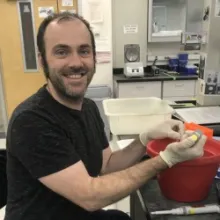
When
Where
Video-Recording
Learning Materials
Tutorial for using the workflow
Additional Reading: Paper1; Paper2
Documentation (ReadTheDocs)
About the Webinar
This introductory-level webinar will demonstrate how to generate raw RNA sequence data using Oxford Nanopore Technology and how to use CyVerse tools to preliminarily process the sequences. Sequencing RNA is a basic first step in interpreting the functional elements of an organism's genome. With the advent of portable commercial sequencing devices based on Nanopore technology, RNA sequencing analyses can be done in the field, in the lab, and easily applied to plants, animals, microbes, and humans. In this introductory level webinar, University of Arizona research associate/plant biologist Andrew Nelson will demonstrate how to generate raw RNA sequence data using Nanopore Oxford Technology and how to use CyVerse apps and tools to preliminarily process the raw sequences to allow you to use other apps in CyVerse (such as NanoDJ) to do genome assembly (Webinar 2) or metagenomics analyses (Webinar 3).
About the Presenter

Andrew Nelson is a plant biologist who studies the "dark side" of the genome that scientists don't think about on a regular basis: the portion of the genome that is transcribed - but not producing proteins. These non-coding transcripts come in a variety of sizes, but can have an out-sized effect on plant development and stress responses. As a research scientist at the University of Arizona in the School of Plant Sciences, Andrew uses a combination of bioinformatic, genomic, molecular, and evolutionary tools to identify and functionally characterize lncRNAs that help plants respond to environmental stresses like heat and drought. Outside of work, Andrew and his wife are avid cyclists, hikers, and rock climbers, who are exploring all the good places to eat in Tucson before they leave later this fall for Cornell, where Andrew has taken a faculty positions at the Boyce Thompson Institute.

